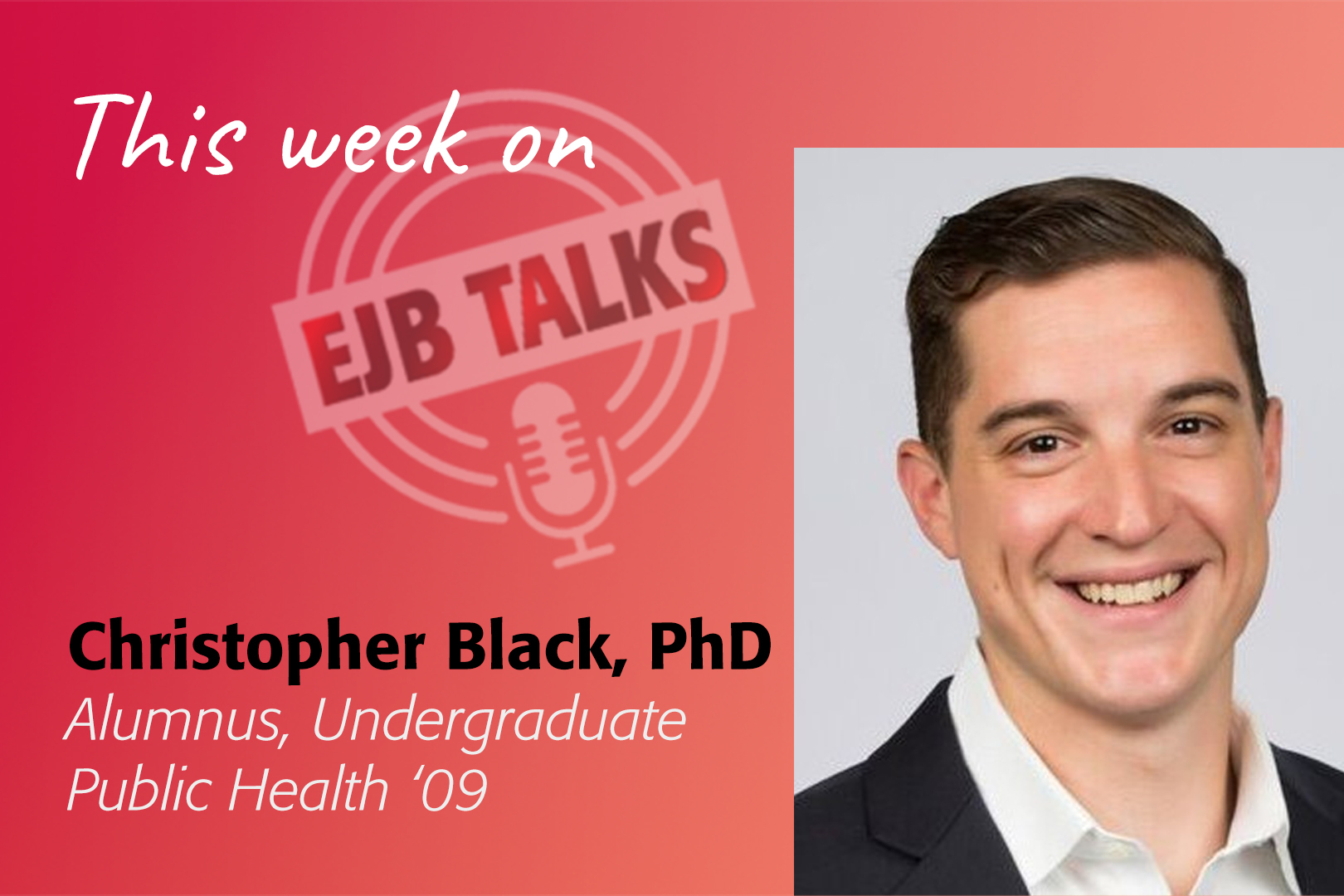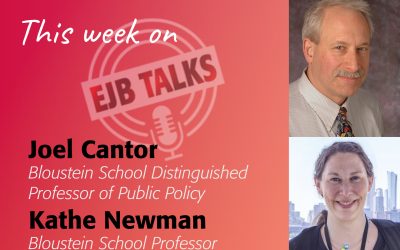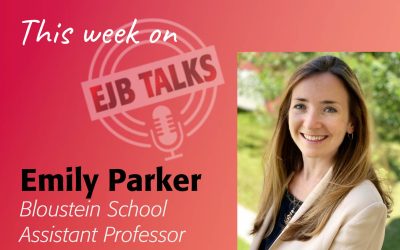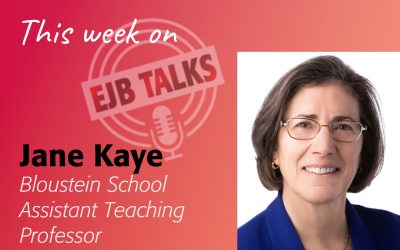From Public Health to Pharma Professional: Alumus and Advisory Board Member Christopher Black EJB (PH) ’09
This week on EJB Talks Stuart Shapiro talks to public health alumnus Christopher Black, Ph.D. Also a member of the Bloustein School Advisory Board who now works Senior Director, Real-World Evidence & Outcomes Research at Merck & Co., Inc., Chris shares his story of pursuing a public health degree after struggling with organic chemistry. With guidance from mentor Dr. Dona Schneider, retired Bloustein School professor and associate dean, Chris took a few years to work and teach before getting an advanced degree in public health, focusing on epidemiology and biostatistics. He also explains his 13-year career at Merck in health economics and outcomes research, where he helps design studies and evaluate new therapies, including individualized cancer treatment. Chris emphasizes how a public health background provides intellectual stimulation across industries and topics, encouraging soon-to-be graduates of the school to take every opportunity as a learning experience.
Transcript:
Stuart Shapiro
Welcome to EJB Talks. I’m Stuart Shapiro, the dean of the Bloustein school. And the purpose of this podcast is to highlight the work my colleagues and our alumni in the fields of policy, planning, and health are doing.
For what is likely to be our penultimate episode of this 10th season of EJB Talks. We’re talking to Dr. Christopher Black, who graduated from our undergraduate public health program, and is now vice chair of our Advisory Board. Chris works at Merck, when he’s not advising or harassing me about how to make the Bloustein School a better place. Welcome to the podcast, Chris!
Chris Black
(laughing) I wasn’t expecting that! But that’s very true!
Stuart Shapiro
(laughing) So we always tend to start these with origin stories. Tell us a little bit about why you decided to get a public health degree, because that is relevant to the younger members of our audience.
Chris Black
Yeah, thanks. So I think like, like many students entering into college, often many of them want to go into pre-med and become physicians. And I was just like a lot of them. And I would say just like many of as well, I felt confident that this was going to be my future plan until I took chemistry and organic chemistry. And then I found myself realizing, this isn’t for me. But I didn’t give up. You know, it’s a difficult pill to swallow. But I didn’t give up on my interest in health. And after taking some of the intro courses within the public health curriculum, I came to learn, and love, that public health really–I think–ties together so many different disciplines. And opens your mind into how interdependent one’s health is with their surroundings. And personally to me, my real ‘aha’ moment, was when I took my Intro to Epidemiology with Dr. Schneider. And after the first day, I fell in love with it. And I spoke with her after class and said, what can I do? What degree do I need to get? What career can I have? This is this is what I want to do. And I finally felt like I found my purpose, which is such a corny thing to say, but it’s so true. So ever since then, everything she said, I’ve done. And I find myself just following those footsteps ever since.
Stuart Shapiro
For those of you that don’t know, Dr. Dona Schneider was a longtime faculty member here at the Bloustein School. A former Associate Dean of Academic Programs and my colleague for nearly 20 years. She retired right after the pandemic occurred. So… and we miss her here.
It’s funny you say that about organic chemistry, the number of students that we get because, they ran aground in that class in particular. And we’re trying, we’re actually trying to figure out, what’s a better way to sort of message to that audience in particular, those that fail or get a D or are just not happy with their grade in organic chemistry. Or come to the realization that that’s not what they want to do, because of that class. They don’t have to have done badly at it to come here. But it is certainly an audience that we are looking at attracting to a greater degree.
Chris Black
Yes, totally.
Stuart Shapiro
So you got your bachelor’s degree in public health, the same place about 300 of our students will be in next week at graduation. And you had to make a decision about what next. And you got a master’s degree and a doctorate in public health. And you’ve sort of alluded to this in your talking about your love for the material. But you know, taking on that much extra education is not a decision to take lightly. What was your thought processes as you did it? Yeah.
Chris Black
So after talking with Dr. Schneider, towards the end of my undergrad, we talked and said hey, what’s next? And I said, I want to do research, I love it. She said, well, then you need to get it going to need to get a master’s. So she suggested — I do whatever she said — so I got into a concentration in epidemiology and biostatistics. Which in my mind go hand in hand. And wasn’t necessarily easy to complete all that in a short period of time. But it really helped me leave, and understand, the intersection of those two disciplines much better. I feel if you can’t design a study, you don’t know how to analyze the data. And you can’t analyze data if you don’t know where this data came from.
So yes, I finished my master’s, worked for a couple years. So after I finished my master’s I met with Dr. Schneider, and then she said what next? I said I want to do my Ph.D. And she looked me in the eyes and said, You’re not ready, you’re too young, you’re too immature, you’re not ready, go work for a couple of years. And I was like, I was heartbroken. So I worked for a couple years and I actually taught that class that I took with her that really turned me on to epidemiology as kind of an homage to to Dr. Schneider, and trying to get other students interested in epidemiology and types of research. And then years later, I called her up and said, I think I’m ready. And she said yeah, I think you’re ready. So I went back and did my PhD part-time at the School of Public Health in epidemiology while working full-time.
Stuart Shapiro
Yeah. And how was that? Because a Ph.D. is not something that’s a small-time commitment? And doing that while you’re working full-time. Can you give me a picture of what that was like?
Chris Black
Yeah. So I don’t make this all about Dr. Schneider. But I’ll tell you another story about her. So after I, after I passed my qualifying exam, she called me right away and said, don’t you dare rest on your laurels. You’ve got to get to work. So I wrote my protocol. At my protocol defense, she tells me, hey, just you know, I’m retiring in six months. You have to finish your dissertation in six months. So I finished my dissertation six months! And for those who are not aware, that usually those take at least a year.
But she was right. And she did not retire in six months, which I found out that my dissertation defense! But I did have a son, my first son one week after I graduated. So if I didn’t finish in six months, there’s a good chance I wouldn’t have finished it for a few years. But to answer your question more directly. It was tough, for sure. It was a lot of working nine to five, staying in the office and doing work afterwards, to going to classes at night. And yeah, it took a lot. But it was… I had a goal in mind that this is what I needed. I worked in an industry where this is expected. And it made it a bit easier to sacrifice other things. To study that one night, or maybe not go out that weekend, because I have a paper due. Or you know, spent all weekend coding to get my dissertation completed.
Stuart Shapiro
Yeah, I did most of my dissertation work while I was a full-time graduate student. But I started working in Washington at what would be about five months before I defended. And I needed to, essentially rewrite. Do a lot of rewriting. I’d done all the primary research at that point. But a lot of the writing still had to be done. And those were a hard five months because, it was not really a nine-to-five job, it was more like an 830-to-630 job. And just like you I remember like, you know man, I can’t get my social life started here while I’m doing it. And had to make those sacrifices for a little while. It’s not easy for sure. Tell us about what you do at Merck.
Chris Black
So I’ve been at Merck for 13 years. I joined in the Health Economics and Outcomes Research Fellowship Program that was hosted back then. And I like to think, really, I break my responsibilities down into three areas. Kind of pre-launch, at-launch and post-launch. When I mean “launch,” I mean, basically, regulatory approval. So before a drug, so while a drug has been in clinical development, you know, phas two, phase three. I’m responsible for selecting the patient-reported outcomes that are included in the trial and helping design those trials. So ultimately, my responsibility is to make sure that the patient perspective is accurately measured in the trial. Understanding how the drugs impact, positively or negatively, their quality of life, their activities of daily living, and so on.
As we get closer to launch. So when a drug has gone to the FDA, EMA has been approved. We then have to work with national payers or health systems to explain that they’re getting value for their money. That this drug is cost-effective compared to the other available therapies. That it is going to improve outcomes. And it ultimately, is going to be a good investment. And then at the time of and after launch, really we need to understand how these drugs being used? How are who are the patients receiving them? Because they’re often different than the clinical trials. How long are they on treatment? Are they adhering to how the way that the drug is prescribed? Are they responding? So what are the clinical outcomes? Are they are they living longer? Are they staying? Are they avoiding a recurrence or disease progression? And then also, how do our drugs actually compare to other ones in the real world? So understanding and doing some really interesting studies to compare those.
So my role is to design those real-world evidence studies, either collecting data ourselves, or using available datasets to do these analyses. And currently my role is. I’m the value-evidenced asset lead for a really innovative therapy we call “individualized neoantigen therapy” for cancer patients. Which actually is, it’s quite interesting. They take the patient’s blood and tissue and look at the different mutations that are present in the tumor versus in the blood. And using an AI algorithm, they select these mutations to manufacture an individualized therapy for these patients. And the face to date is quite robust. It’s pretty cutting-edge stuff. And we’re quite excited to be working on it. So it’s, it’s great! A lot of good research work with a lot of really smart people. I enjoy it every day!
Stuart Shapiro
And that… I don’t know much about this. But that individualized type of therapy I’ve seen referred to as, to some degree, the future of pharmaceuticals.
Chris Black
Yeah, I think we’ve come a long way.
Stuart Shapiro
So let’s complete the circle here and talk a little bit about how you use your public health background. Pharmaceuticals isn’t the first area that public health or even health administration folks think about going into. But it, in my view, it’s a place that makes a lot of sense for people with that background. And I’m wondering if you could make that connection for our audience.
Chris Black
Sure. So I enjoy doing research. I enjoy designing studies. I enjoy solving problems. I enjoy finding new solutions that help impact people’s lives. So the other day, I was actually updating my CV, and I was going through the publication section. And you would think I’m schizophrenic based on all the different disease areas I’ve published in. So talking about, during my master’s I worked at the Veterans Affairs hospital, you know, working on mental health, behavioral sciences. So topics like depression, suicidality, substance abuse, homelessness. Then for my master’s thesis I did on rugby injury surveillance. Which is the first time I think I’ve ever been a part of a study that I was actually a patient, and also the study investigator. So that’s always interesting thing.
I’ve worked on STD awareness. I did my dissertation on severe maternal morbidity. And then at Merck, I’ve worked across all different disease areas. What I’ve learned is that the knowledge that you gain with a public health degree and an epidemiology background is, it’s all disease agnostic. You can work in any industry, on any different topic. And as long as you understand and implement the skills that you’ve learned, you can do anything, really. And I find the, “why pharma?” part? Pharma plays a huge role in the global health ecosystem. What we do does have an impact. And it’s really interesting to be involved in that. But also work with really strong scientists doing really robust research, where the bar is set higher and higher every day. And I always find myself challenged. And it’s just…. I’ve worked in government, academia for a little bit, and also pharma. And I can say, it’s, it’s a really great place to work. And I, I really enjoy it.
Stuart Shapiro
Yeah, if we ever had any doubt of that, obviously, our experience with COVID, and now we see bird flu in the in the newspapers. We don’t solve those problems without figuring out the pharmaceutical solutions.
Chris Black
Yes!
Stuart Shapiro
What’s the best part of your job?
Chris Black
Hmmm. I like, not sure if it’s the best, but probably one of my favorite parts is, I’m always intellectually stimulated every day. You know, just talking about the therapy we’re working on, figuring out some of the logistics of how to deliver that, is quite challenging. Thinking about, how do you demonstrate value for an individualized therapy, compared to something that’s available off the shelf, it’s different, right? And then, just thinking outside the box. Being able to leverage new methodologies, data sources, embracing the whole AI-ML boom. I know enough to get myself in trouble. I don’t know enough to really implement it in a very effective way. But I’m continuing to learn. And we’re always, we’re being empowered to do that. And it also comes with a lot of opportunities to present and travel. You learn a lot about yourself when you’re in front of a few thousand people, on a stage all by yourself. And everyone in there is much smarter than you are. And here you are trying to tell them about some of your research. So it’s really… I enjoy it. I think, but most important part for me is the intellectual stimulation.
Stuart Shapiro
So next week, a week from Monday, I get to be in front of a couple thousand people at our graduation. And so I know what you’re talking about. But as I think about those people I will be in front of, particularly the graduates, and given your expertise, particularly the public health and health administration students. As they’re looking at a lot of big decisions in the next few years, what advice would you give them?
Chris Black
Yeah, I would say for the undergraduates. Get to know the staff and faculty. Find a sponsor. Find someone who will promote you, who will give you good advice. I think, we often don’t leverage or utilize the faculty knowing that, part of their responsibility, it really is to help advise students, not just to teach. And then for those who are graduating, take every opportunity as a learning experience. You might learn that you like something, you might learn that you hate something. And you don’t want to do that. But that’s a good thing to learn. So that the next opportunity that comes about, you can decide and have an educated decision whether to do that, or to not move forward with that opportunity.
Stuart Shapiro
It is really important to understand what you don’t like just as much as what you like.
Chris Black
Yes!
Stuart Shapiro
Chris, thank you so much for coming on the podcast and sharing that experience and advice which I think will be valuable for our students.
Chris Black
Great. Thanks Stuart!
Stuart Shapiro
Also, of course a big thank you to Tamara Swedberg and to Karen Olsen who make this podcast run. We will be back with probably with one more episode this season, probably wrapping up with something on politics. Although we may wait until a certain trial in New York City concludes before we take that episode. Until then, stay safe!




